Colorado River Symposium Gives Tucson Community Access to National Water Governance Experts
Roughly 100 community members turned out to engage with the 13 scholars involved with the comprehensive symposium.
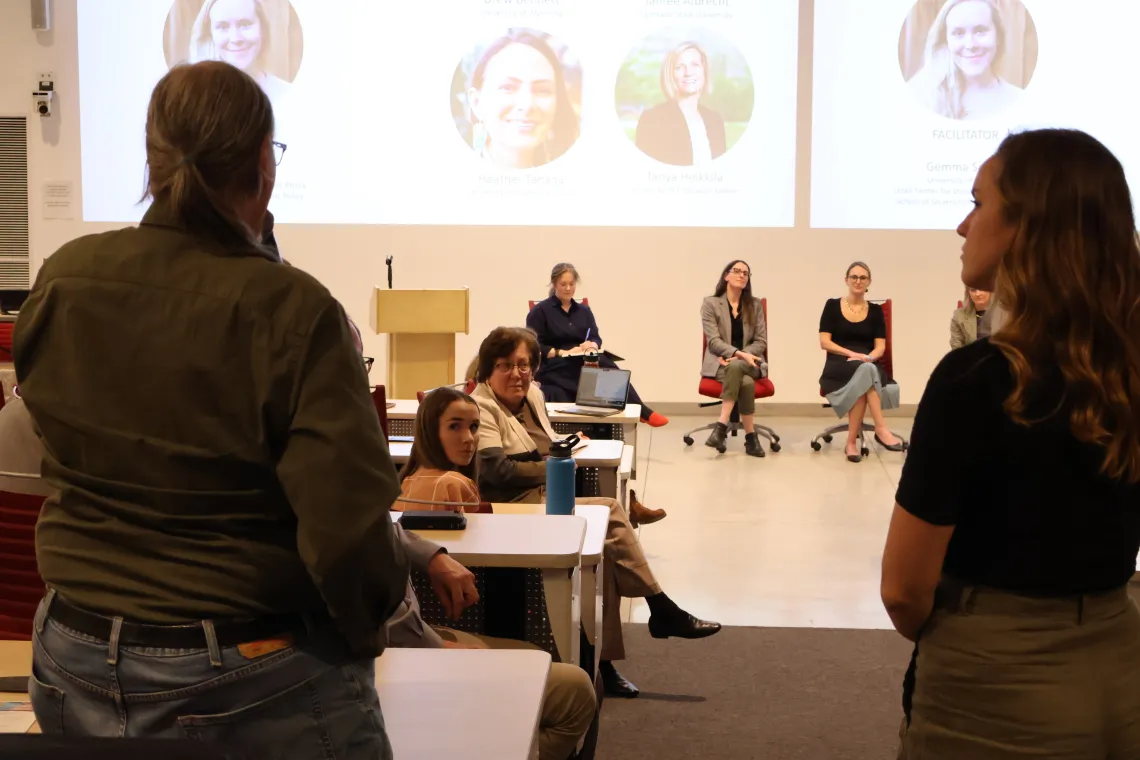
For those of us living in the arid southwestern United States, the reality of the growing regional water crisis is a point of constant stress.
The Colorado River is the lifeblood of the desert southwest, providing roughly 40 million people in seven U.S. states, two Mexican states and 30 federally recognized Tribes with water, power, and recreation while also supporting countless ecosystems and immense biodiversity along its 1450-mile course.
But the river, once considered an abundant source of freshwater for the region, is drying up. In fact, the amount of water we consume to support agriculture, urban life and myriad other uses each year is about 1.2 million acre feet more than the river provides annually. That’s a structural deficit that itself would be enough to support the freshwater needs of roughly 3 million average American households each year.
“We’ve been experiencing considerable pressure in our basin due to overallocation, drought and climate change,” says water governance expert and Udall Center Director Andrea K. Gerlak. Gerlak is also a Professor in the UArizona School of Geography, Development and Environment.
Reminders of existential threats to your community aren’t exactly the type of thing you want to read every day as you're drinking your morning coffee, but Gerlak points out that the decades-long drying of the Colorado River has attracted “national and regional media attention in recent years. We can hardly open the newspaper without reading a story related to the basin,” she says.
It’s for this reason that Gerlak decided it was time to draw on her influence as a top scholar and thought leader in the world of transboundary water governance and policy to invite eight other leading scholars in this arena to Tucson for a two-day workshop and writing session. During their visit, these scholars also took part in a successful and engaging public symposium about the threats facing this critical resource, as well as possible paths forward to protect and preserve its long-term existence.
Navigating the Rapids: Colorado River Governance in the 21st Century
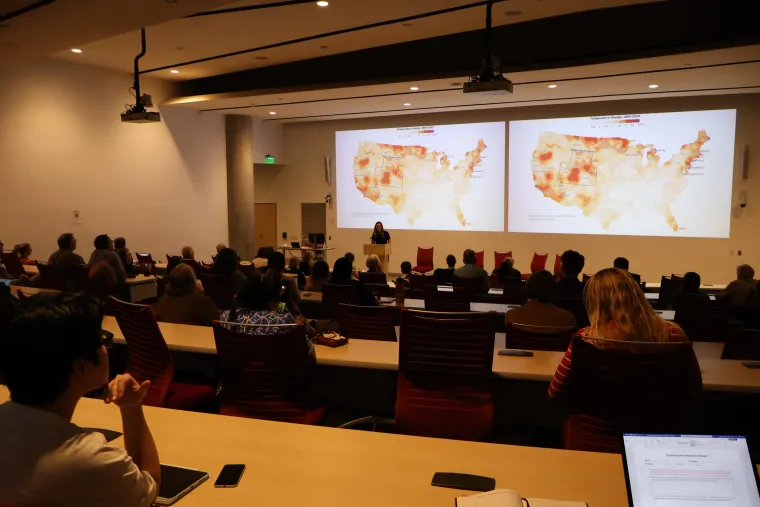
Udall Center Research Scientist Gina Gilson presents "Colorado River 101" during the public symposium.
About 100 community members, water professionals and conservation advocates packed the Agnese Nelms Haury Auditorium in UArizona’s ENR2 building on Thursday, Feb 15, 2024 for the two-hour symposium billed as perhaps “the most comprehensive discussion of the year examining Colorado River governance and policy.”
The event, titled “Navigating the Rapids: Colorado River Governance in the 21st Century,” was organized in partnership between the UArizona Udall Center for Studies in Public Policy (UC), the Water Resources Research Center (WRRC) and the Arizona Institute for Resilience’s Center for Climate Adaptation Science & Solutions (CCASS).
Participating panelists came from across the Colorado River Basin and beyond, bringing with them a range of academic and professional expertise that ran the gamut of water management knowledge including transboundary policy research, collaborative governance, agricultural rights and incentives, urban water use, environmental needs, Tribal water rights and interests, water law and more.
Organizers for the event included UC Director Andrea Gerlak and UC Research Scientist Gina Gilson with support from UC Program Coordinator Molli Bryson. The UC’s newest joint faculty member, Gemma Smith, who holds the title of Assistant Professor in the School of Government and Public Policy in addition to her UC appointment, participated as a panel moderator.
The event was also something of a homecoming for several of the out-of-town guests at the event such as Dustin Garrick, Tamee Albrecht, Tanya Heikkila, and Doug Kenney, all of whom spent time at UArizona during their graduate studies.
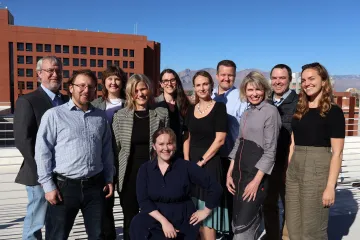
UArizona and invited scholars pose on the ENR2 rooftop during their joint workshop and writing session.
The scholars and experts present at the public symposium included (in alphabetical order):
- Tamee Albrecht, Assistant Professor in the Department of Ecosystem Science and Sustainability at Colorado State University
- Drew Bennett, Whitney MacMillan Professor of Practice in the Private Lands Stewardship Program at the University of Wyoming
- Dustin Garrick, University Research Chair in Water and Development Policy at the University of Waterloo
- Andrea K. Gerlak, UC Director and Professor in the UArizona School of Geography, Development and Environment
- Gina Gilson, UC Environmental Policy Program Research Scientist
- Tanya Heikkila, Co-Director of the Center for Policy and Democracy at the University of Colorado-Denver
- Katharine Jacobs, Director of the CCASS and Uarizona Professor of Environmental Science
- Douglas Kenney, Director of the Western Water Policy Program at the University of Colorado School of Law
- Elizabeth Koebele, Associate Professor of Political Science at the University of Nevada, Reno
- Rhett Larson, Richard Morrison Professor of Water Law at Arizona State University
- Sharon Megdal, Director of the WRRC
- Gemma Smith, UC Assistant Research Professor and Assistant Professor in the UArizona School of Government and Public Policy
- Heather Tanana (Diné/Navajo), Visiting Professor of Law at the University of California, Irvine
Presenters offered two brief informational sessions on the history and recent policy developments in the Colorado River, as well as two expert panel discussions on “Digging into the Diverse Interests” who depend on the river for water and energy and “Naming the Elephants in the Room” related to the policy, resource availability and long-term conservation of the Colorado River.
The Elephants in the Room: “A Positively Ponderous Plethora of Plumped Pachyderms.”
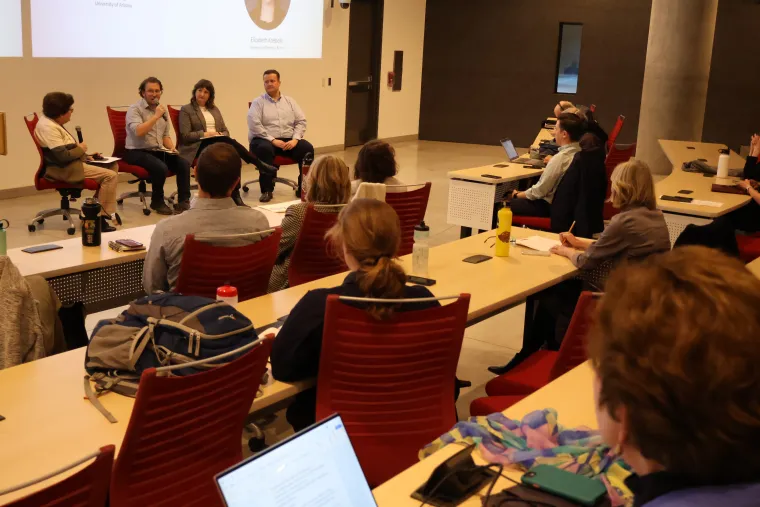
(From left) Sharon Megdal, Dustin Garrick, Elizabeth Koebele and Rhett Larson discuss the "Elephants in the Room" with respect to Colorado River Governance.
The challenges facing the future of the Colorado River – and, therefore, the future of sustainable living in the arid southwest – are complex and colossal.
The interest groups who depend on the river for freshwater include major municipalities like Los Angeles, Las Vegas, Phoenix and Albuquerque; agricultural producers who currently use approximately 80 percent of the water taken from the river; the region’s Tribes and Native nations, many of whom have yet to have their water rights officially adjudicated; and, of course, the natural world.
In the words of water lawyer and Richard Morrison Professor of Water Law at Arizona State University Rhett Larson, “We are not running out of water (in the southwest). We are running out of cheap water. We have lots of water and we can do a lot of great things in this basin, but we can’t do every good thing.”
The complicating factors associated with renegotiating the distribution of Colorado River water equitably and efficiently – deemed the “elephants in the room” by symposium organizers – include fragmented management and policy systems, unadjudicated water rights, lingering uncertainty in terms of the actual amount of water in the system and how much is being used, and a lack of trust between governments and individuals that want to ensure their own water and energy needs are met before the needs of other interest groups are addressed. Not to mention the fact that the interim federal guidance on managing the water deficit on the river expires in 2026, giving policymakers just two years to come up with a revised governance structure.
According to Larson, “There is a positively ponderous plethora of plumped pachyderms” in the Colorado River governance room. Luckily, there is also a host of experts and scholars ready to rise up and meet the moment.
Our Collaborative Water Future
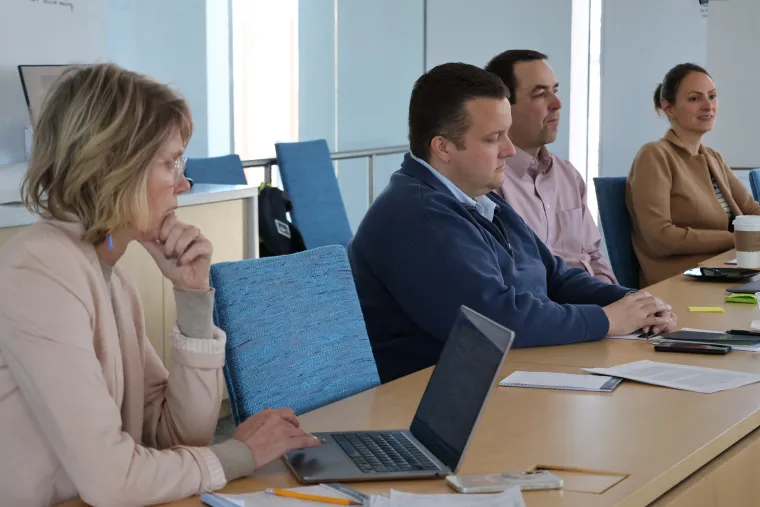
(From left) Andrea Gerlak, Rhett Larson, Drew Bennett and Heather Tanana discuss priorities and strategy during a two-day water governance workshop in Tucson.
The give-and-take from the public symposium made one thing clear: forging a sustainable future for the Colorado River and all who rely on it is going to require improved collaboration at all levels – collaboration between individuals; between governments; between interest groups and between scientists and policymakers.
“Climate change is really going to be a pressure point for conflict,” said Tanya Heikkila, Co-Director of the Center for Policy and Democracy at the University of Colorado-Denver. “But I’ve been studying conflict for a long time in these types of systems and conflict can also be a source of innovation, a source of learning and it’s how we manage that conflict that can be really important.”
“This urgency and need to take action has forced people to talk to one another and to realize that we can’t continue with the status quo,” offered Heather Tanana, Visiting Professor of Law at the University of California, Irvine.
To that end, the invited scholars and UC researchers involved in the symposium and associated two-day workshop are in the process of collaborating to form an organized research network dedicated to Colorado River governance.
“The goal is to really dig into the governance and policy issues around the Colorado River,” said Gerlak, “and to think critically about how we manage the river, how we design the various policies and approaches to sharing the resources it provides and how we can best support the various interests in the basin, from Tribes to cities to farms.”
It would seem the team assembled for this event is as well-suited to this mission as any. Said UArizona Interim Senior Vice President of Research and Innovation Elliot Cheu in his closing remarks at the symposium, “I’m a little more optimistic today after hearing some of this than I was 24 hours ago just knowing that there are very intelligent, devoted people who are trying to move to a solution that will solve (these challenges) for everybody.”
Watch a recording of the full Colorado River Governance Symposium here.

